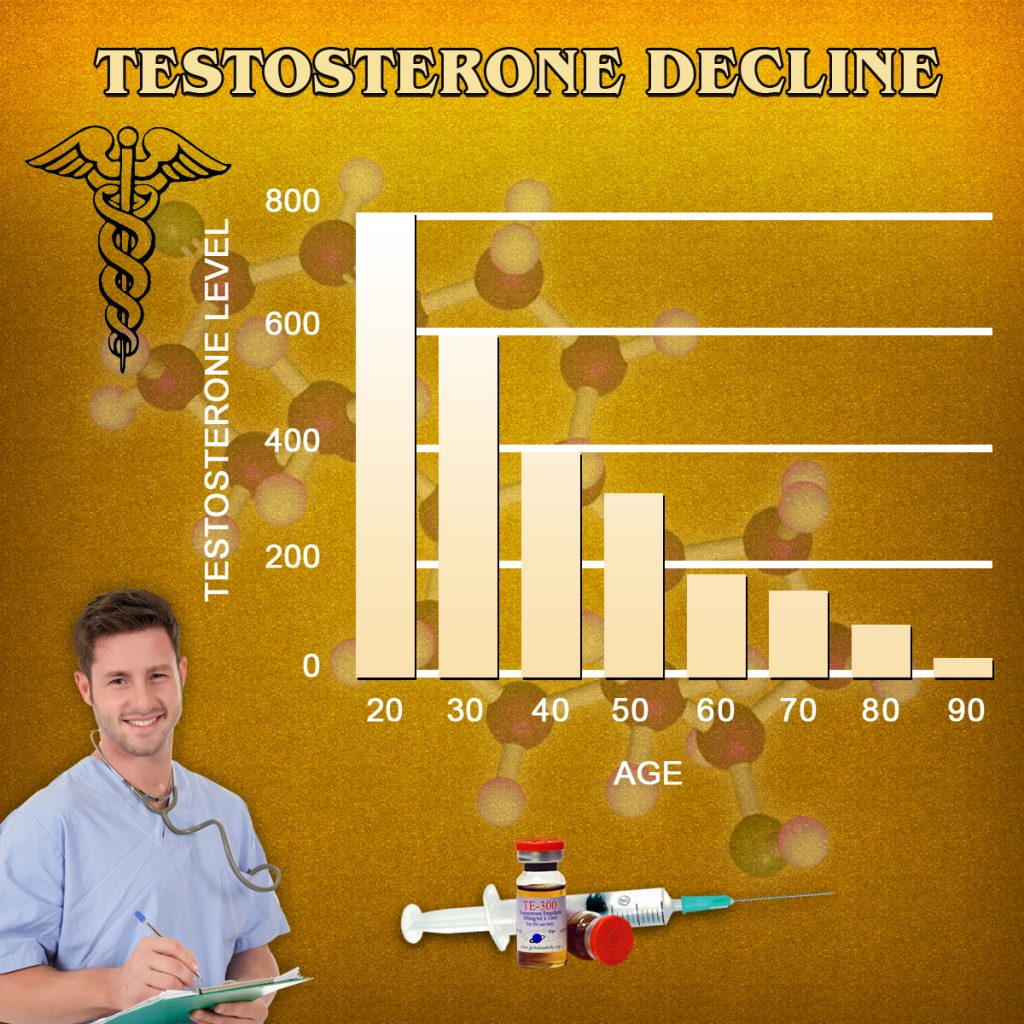 Hypogonadism is a concerning medical diagnosis that applies to any condition which inhibits the production of sex hormones in humans. These hormones are primarily produced by male and female sex organs (testes in males and ovaries in females).
Hypogonadism is a concerning medical diagnosis that applies to any condition which inhibits the production of sex hormones in humans. These hormones are primarily produced by male and female sex organs (testes in males and ovaries in females).
Still, the adrenal glands and other organs also participate in production to a lesser extent.
In males, hypogonadism is often referred to as low-T or andropause. Low testosterone is a serious problem for modern men these days and can lead to a whole host of maladies.
In females, hypogonadism is also called primary ovarian insufficiency.
Puberty and Maturity in Adults
Sex hormones are responsible for the development of both primary and secondary sex characteristics.
Primary sex characteristics are developed via sex hormone stimulation during pregnancy, and secondary sex characteristics develop during puberty (pubic hair growth, breast development in women, penis enlargement, and deepening of the voice in men).
During adulthood, sex hormones, such as testosterone and estrogen, play a huge role in sexual function, libido, and various other physiological systems.
Video Link: https://vimeo.com/413340685
Video Download: Primer On Hypogonadism Two Major Types And Causes Of It
Video Stream: Primer On Hypogonadism Two Major Types And Causes Of It
What Are the Different Types of Hypogonadism?
 Hypogonadism is divided into two categories, dependent upon the source of the malfunction: primary and secondary:
Hypogonadism is divided into two categories, dependent upon the source of the malfunction: primary and secondary:
Primary hypogonadism is caused by a dysfunction of the sex organs (testes/ovaries) which suppresses hormone production.
In this case, the pituitary gland still sends messages to the organs to produce hormones, but the target organ is unable to sufficiently respond to the stimulus.
This suggests a malfunction at the intended organ, not with the signaling, and seeking a medical protocol to replenish these lacking hormones is the order of the day. Our physicians can talk to you about what hormones you can take synergistically to bring yourself back to balance.
Secondary hypogonadism is also medically referred to as central hypogonadism. For patients diagnosed under this umbrella, the sex organs are fully functional, but they aren't receiving enough signal to produce the critical sex hormones that the body needs to optimize sexual and physiological function.
If you suffer from this kind of hormone dysfunction, a protocol can be provided, which will replenish these missing hormones, and can restore your optimal balance by accounting for the signaling dysfunction.
The cause of this dysfunction is rooted in issues with either the pituitary gland or the hypothalamus, both of which produce critical precursor hormones that influence testosterone and estrogen production. Most men with testosterone deficiency suffer from secondary hypogonadism.
 What Causes Contribute to Hypogonadism?
What Causes Contribute to Hypogonadism?
There are a wide variety of maladies that can lead to hypogonadism. Some of these causes are temporary, while others are permanent, causing hypogonadism to be a chronic condition.
Most of the time, hypogonadism will not resolve on its own, unless it's due to a nutritional deficiency or substance abuse. It usually requires medical intervention.
Causes of Primary Hypogonadism
- Certain genetic conditions can impact the development of the sex organs, including Klinefelter Syndrome and Turner Syndrome. Klinefelter syndrome is a chromosomal condition (an extra X chromosome) in males that affects both physical and intellectual development, and patients have small testes that produce little testosterone. Turner Syndrome is a chromosomal condition (missing or partially missing X chromosome) in females, which causes developmental issues and failure of the ovaries to develop, leading to minimal estrogen production.
- Any event which damages the testes or ovaries can lead to primary hypogonadism, including radiation, injury, or surgery. Major infections can also temporarily or permanently damage the sex organs as well, including mumps.
- Autoimmune conditions such as hypoparathyroidism (overactivity of the parathyroid gland) and Addison's disease (insufficient hormone release by the adrenal glands) can disrupt the ability of the sex organs to produce hormones.
- Various conditions, especially those associated with kidney and liver disease, can have downstream effects that damage the sex organs. Iron overdose (hemochromatosis) is also a known contributor to primary hypogonadism.
- Undescended testicles impair hormone production.
Causes of Secondary Hypogonadism
- Certain genetic conditions can impact the development of the hypothalamus/pituitary gland, including Kallman Syndrome (delayed or absent puberty).
- Physical damage to specific areas of the brain caused by injury, surgery, or cancer treatment can also suppress the release of sex hormone precursors. HIV and other infections can produce similar effects.
- Histiocytosis, tuberculosis, sarcoidosis, and other inflammatory conditions can also damage or otherwise impact the hypothalamic/pituitary function.
- Pituitary tumors reduce the function of the organ, as well as any tumor which puts pressure on or squeezes the pituitary gland.
- Central hypogonadism is often correlated with poor lifestyle choices. Obesity suppresses pituitary function, as does malnutrition. If the body isn't getting the nutrients it needs, the body will reduce sex hormone release to promote and preserve other vital functions.
- Opioids have the side effect of reducing both testosterone and estrogen, while steroids suppress natural testosterone production and increase estrogen secretion.
 For the most part, hypogonadism treatment is very effective at helping adults live better lives.
For the most part, hypogonadism treatment is very effective at helping adults live better lives.
Adults should check to see if their sex hormones are in decline, especially if you have been living a lifestyle lately that is more sedentary, full of junk food and includes chronic stress.
If you think you might be experiencing declining sex hormones or your sex hormones are unbalanced, fill out the medical contact form, and we will have a medical specialist adviser contact you.
Let us talk about your options! Give our medical clinic a call to set you up for a blood test to see how much of this hormonal deficiency exists. Fill out the contact form on our website, and we will get in touch with you in 24 to 48 hours.
Contact Us For A Fast And Professional Response

- Cheyenne Sermorelin for HGH Deficiency [Last Updated On: April 6th, 2023] [Originally Added On: November 3rd, 2018]
- Milwaukee Sermorelin for HGH Deficiency [Last Updated On: April 19th, 2023] [Originally Added On: November 3rd, 2018]
- Madison Sermorelin for HGH Deficiency [Last Updated On: February 14th, 2023] [Originally Added On: November 3rd, 2018]
- Green Bay Sermorelin for HGH Deficiency [Last Updated On: May 10th, 2023] [Originally Added On: November 3rd, 2018]
- Charleston Sermorelin for HGH Deficiency [Last Updated On: February 26th, 2023] [Originally Added On: November 3rd, 2018]
- Vancouver Sermorelin for HGH Deficiency [Last Updated On: October 2nd, 2023] [Originally Added On: November 3rd, 2018]
- Tacoma Sermorelin for HGH Deficiency [Last Updated On: May 28th, 2023] [Originally Added On: November 3rd, 2018]
- Spokane Sermorelin for HGH Deficiency [Last Updated On: March 23rd, 2023] [Originally Added On: November 3rd, 2018]
- Seattle Sermorelin for HGH Deficiency [Last Updated On: May 16th, 2023] [Originally Added On: November 3rd, 2018]
- Bellevue Sermorelin for HGH Deficiency [Last Updated On: March 6th, 2023] [Originally Added On: November 3rd, 2018]
- Virginia Beach Sermorelin for HGH Deficiency [Last Updated On: March 23rd, 2023] [Originally Added On: November 3rd, 2018]
- Richmond Sermorelin for HGH Deficiency [Last Updated On: April 23rd, 2023] [Originally Added On: November 3rd, 2018]
- Portsmouth Sermorelin for HGH Deficiency [Last Updated On: February 18th, 2023] [Originally Added On: November 3rd, 2018]
- Norfolk Sermorelin for HGH Deficiency [Last Updated On: October 12th, 2023] [Originally Added On: November 3rd, 2018]
- Newport News Sermorelin for HGH Deficiency [Last Updated On: January 7th, 2023] [Originally Added On: November 3rd, 2018]
- Hampton Sermorelin for HGH Deficiency [Last Updated On: April 17th, 2023] [Originally Added On: November 3rd, 2018]
- Chesapeake Sermorelin for HGH Deficiency [Last Updated On: March 27th, 2023] [Originally Added On: November 3rd, 2018]
- Arlington, Virginia Sermorelin for HGH Deficiency [Last Updated On: July 24th, 2023] [Originally Added On: November 3rd, 2018]
- Alexandria Sermorelin for HGH Deficiency [Last Updated On: May 27th, 2023] [Originally Added On: November 3rd, 2018]
- Montpelier Sermorelin for HGH Deficiency [Last Updated On: May 2nd, 2023] [Originally Added On: November 3rd, 2018]
- West Valley City Sermorelin for HGH Deficiency [Last Updated On: December 27th, 2023] [Originally Added On: November 3rd, 2018]
- West Jordan Sermorelin for HGH Deficiency [Last Updated On: April 27th, 2023] [Originally Added On: November 3rd, 2018]
- Salt Lake City Sermorelin for HGH Deficiency [Last Updated On: July 11th, 2023] [Originally Added On: November 3rd, 2018]
- Provo Sermorelin for HGH Deficiency [Last Updated On: March 11th, 2023] [Originally Added On: November 4th, 2018]
- Wichita Falls Sermorelin for HGH Deficiency [Last Updated On: May 26th, 2023] [Originally Added On: November 4th, 2018]
- Waco Sermorelin for HGH Deficiency [Last Updated On: February 19th, 2023] [Originally Added On: November 4th, 2018]
- San Antonio Sermorelin for HGH Deficiency [Last Updated On: November 5th, 2023] [Originally Added On: November 4th, 2018]
- Round Rock Sermorelin for HGH Deficiency [Last Updated On: November 11th, 2023] [Originally Added On: November 4th, 2018]
- Richardson Sermorelin for HGH Deficiency [Last Updated On: February 7th, 2023] [Originally Added On: November 4th, 2018]
- Plano Sermorelin for HGH Deficiency [Last Updated On: July 18th, 2023] [Originally Added On: November 4th, 2018]
- Pasadena Sermorelin for HGH Deficiency [Last Updated On: September 7th, 2023] [Originally Added On: November 4th, 2018]
- Midland Sermorelin for HGH Deficiency [Last Updated On: November 22nd, 2023] [Originally Added On: November 4th, 2018]
- Mesquite Sermorelin for HGH Deficiency [Last Updated On: October 22nd, 2023] [Originally Added On: November 4th, 2018]
- McKinney Sermorelin for HGH Deficiency [Last Updated On: December 21st, 2023] [Originally Added On: November 4th, 2018]
- McAllen Sermorelin for HGH Deficiency [Last Updated On: February 17th, 2023] [Originally Added On: November 4th, 2018]
- Lubbock Sermorelin for HGH Deficiency [Last Updated On: September 10th, 2023] [Originally Added On: November 4th, 2018]
- Lewisville Sermorelin for HGH Deficiency [Last Updated On: September 7th, 2023] [Originally Added On: November 4th, 2018]
- Laredo Sermorelin for HGH Deficiency [Last Updated On: August 10th, 2023] [Originally Added On: November 4th, 2018]
- Killeen Sermorelin for HGH Deficiency [Last Updated On: February 23rd, 2023] [Originally Added On: November 4th, 2018]
- Irving Sermorelin for HGH Deficiency [Last Updated On: April 29th, 2023] [Originally Added On: November 4th, 2018]
- Houston Sermorelin for HGH Deficiency [Last Updated On: October 2nd, 2023] [Originally Added On: November 4th, 2018]
- Grand Prairie Sermorelin for HGH Deficiency [Last Updated On: May 18th, 2023] [Originally Added On: November 4th, 2018]
- Garland Sermorelin for HGH Deficiency [Last Updated On: March 7th, 2023] [Originally Added On: November 4th, 2018]
- Fort Worth Sermorelin for HGH Deficiency [Last Updated On: October 28th, 2023] [Originally Added On: November 4th, 2018]
- El Paso Sermorelin for HGH Deficiency [Last Updated On: January 8th, 2023] [Originally Added On: November 4th, 2018]
- Denton Sermorelin for HGH Deficiency [Last Updated On: February 21st, 2023] [Originally Added On: November 4th, 2018]
- Dallas Sermorelin for HGH Deficiency [Last Updated On: April 30th, 2023] [Originally Added On: November 4th, 2018]
- Corpus Christi Sermorelin for HGH Deficiency [Last Updated On: July 30th, 2023] [Originally Added On: November 4th, 2018]
- Carrollton Sermorelin for HGH Deficiency [Last Updated On: February 4th, 2023] [Originally Added On: November 4th, 2018]
- Brownsville Sermorelin for HGH Deficiency [Last Updated On: April 10th, 2023] [Originally Added On: November 4th, 2018]
- Beaumont Sermorelin for HGH Deficiency [Last Updated On: November 27th, 2023] [Originally Added On: November 4th, 2018]
- Austin Sermorelin for HGH Deficiency [Last Updated On: May 13th, 2023] [Originally Added On: November 4th, 2018]
- Arlington Sermorelin for HGH Deficiency [Last Updated On: April 16th, 2023] [Originally Added On: November 4th, 2018]
- Amarillo Sermorelin for HGH Deficiency [Last Updated On: May 14th, 2023] [Originally Added On: November 4th, 2018]
- Abilene Sermorelin for HGH Deficiency [Last Updated On: December 26th, 2023] [Originally Added On: November 4th, 2018]
- Nashville Sermorelin for HGH Deficiency [Last Updated On: March 16th, 2023] [Originally Added On: November 4th, 2018]
- Murfreesboro Sermorelin for HGH Deficiency [Last Updated On: May 18th, 2023] [Originally Added On: November 4th, 2018]
- Memphis Sermorelin for HGH Deficiency [Last Updated On: November 24th, 2023] [Originally Added On: November 4th, 2018]
- Knoxville Sermorelin for HGH Deficiency [Last Updated On: July 16th, 2023] [Originally Added On: November 4th, 2018]
- Clarksville Sermorelin for HGH Deficiency [Last Updated On: July 14th, 2023] [Originally Added On: November 4th, 2018]
- Chattanooga Sermorelin for HGH Deficiency [Last Updated On: May 15th, 2023] [Originally Added On: November 4th, 2018]
- Sioux Falls Sermorelin for HGH Deficiency [Last Updated On: March 5th, 2023] [Originally Added On: November 4th, 2018]
- Columbia Sermorelin for HGH Deficiency [Last Updated On: April 25th, 2023] [Originally Added On: November 4th, 2018]
- Charleston, South Carolina Sermorelin for HGH Deficiency [Last Updated On: October 13th, 2023] [Originally Added On: November 4th, 2018]
- Providence Sermorelin for HGH Deficiency [Last Updated On: April 23rd, 2023] [Originally Added On: November 4th, 2018]
- Pittsburgh Sermorelin for HGH Deficiency [Last Updated On: November 10th, 2023] [Originally Added On: November 4th, 2018]
- Philadelphia Sermorelin for HGH Deficiency [Last Updated On: May 5th, 2023] [Originally Added On: November 4th, 2018]
- Erie Sermorelin for HGH Deficiency [Last Updated On: August 21st, 2023] [Originally Added On: November 4th, 2018]
- Allentown Sermorelin for HGH Deficiency [Last Updated On: February 2nd, 2023] [Originally Added On: November 4th, 2018]
- Salem Sermorelin for HGH Deficiency [Last Updated On: September 25th, 2023] [Originally Added On: November 4th, 2018]
- Portland Sermorelin for HGH Deficiency [Last Updated On: June 29th, 2023] [Originally Added On: November 4th, 2018]
- Gresham Sermorelin for HGH Deficiency [Last Updated On: March 22nd, 2023] [Originally Added On: November 4th, 2018]
- Eugene Sermorelin for HGH Deficiency [Last Updated On: April 30th, 2023] [Originally Added On: November 4th, 2018]
- Tulsa Sermorelin for HGH Deficiency [Last Updated On: September 18th, 2023] [Originally Added On: November 4th, 2018]
- Oklahoma City Sermorelin for HGH Deficiency [Last Updated On: August 22nd, 2023] [Originally Added On: November 4th, 2018]
- Norman Sermorelin for HGH Deficiency [Last Updated On: March 23rd, 2023] [Originally Added On: November 4th, 2018]
- Toledo Sermorelin for HGH Deficiency [Last Updated On: January 29th, 2023] [Originally Added On: November 4th, 2018]
- Dayton Sermorelin for HGH Deficiency [Last Updated On: July 2nd, 2023] [Originally Added On: November 4th, 2018]
- Columbus, Ohio Sermorelin for HGH Deficiency [Last Updated On: July 25th, 2023] [Originally Added On: November 4th, 2018]
- Cleveland Sermorelin for HGH Deficiency [Last Updated On: April 29th, 2023] [Originally Added On: November 4th, 2018]
















